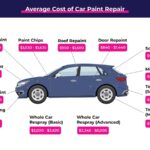Operating an auto repair business from a residential property in California can lead to significant issues, especially when neighbors start complaining. This article delves into the complexities of running such a business, neighbor disputes, and the legal implications in California, drawing insights from a real-life case in Oakland.
Operating an auto repair business, even on a small scale, within a residential area often clashes with zoning laws and neighborhood tranquility. Home-based businesses can offer convenience, but certain types, particularly those involving noise, pollution, and traffic, can quickly become sources of conflict. When auto repair activities spill out of garages and onto driveways and streets, neighbors may feel their quality of life is being negatively impacted, leading to complaints and potential legal battles.
The Oakland Case: A Microcosm of Neighborhood Auto Repair Disputes
In 2012, the City Attorney of Oakland took legal action against residents of a West Oakland property for allegedly running an illegal auto repair business from their home. This case, documented by Oakland North, highlights a scenario that is not unique to Oakland and can occur in various cities across California. The lawsuit alleged that the residents were operating a business out of a three-story home in a residential zone, causing a public nuisance.
Neighbor Grievances: Noise, Pollution, and Disrupted Peace
The neighbors’ complaints in the Oakland case are typical of disputes arising from residential auto repair operations. Key issues included:
- Noise Pollution: Auto repair work often generates significant noise, from power tools to hammering and vehicle engines, disrupting the peace and quiet of a residential neighborhood.
- Air and Visual Pollution: The lawsuit cited “air and visual pollution” as a consequence of the alleged illegal business. This can encompass fumes from paints and solvents, the unsightly presence of car parts and inoperable vehicles, and general disarray associated with repair activities.
- Environmental Hazards: Improper disposal of automotive fluids like oils and gasoline poses environmental risks and violates regulations, adding another layer to neighbor concerns.
- Street Obstruction: As seen in the Oakland case, customer vehicles and project cars can spill onto streets, blocking traffic and parking, further irritating neighbors and potentially violating parking ordinances.
Neighbors in the Oakland case reported years of complaints to city officials, starting as early as 2008. They contacted Code Enforcement repeatedly, highlighting the persistent nature of such neighborhood disputes. Despite car tows and warnings, the issue allegedly continued, demonstrating the challenges in enforcing residential zoning and nuisance laws.
Legal Repercussions for Illegal Auto Repair Businesses
The Oakland City Attorney’s lawsuit sought to legally prohibit the auto repairs and demanded a cleanup of the property. Crucially, it also requested a substantial fine of $1,000 per day for each violation if the residents failed to comply with the court order. This illustrates the potential financial and legal risks associated with operating an unauthorized auto repair business in a residential area in California.
The lawsuit named multiple defendants, including property owners and managers, indicating that responsibility can extend beyond just the individuals performing the repairs. This underscores the importance for property owners to ensure their tenants are not conducting illegal or disruptive businesses on their premises.
The Resident’s Perspective: Economic Necessity vs. Neighborhood Harmony
While neighbors voiced their frustrations, Clara Fields, a resident named in the lawsuit, offered a different perspective. She admitted to her husband fixing cars at the residence but characterized it as helping neighbors and friends due to financial constraints. This highlights a common underlying factor in such situations: economic need driving individuals to operate businesses from home, sometimes without fully understanding or considering the legal and community implications.
Fields’ statement about not being able to afford a commercial shop raises the issue of accessibility and affordability of commercial spaces for small-scale auto repair businesses. However, this economic hardship does not necessarily exempt individuals from complying with zoning laws and respecting neighborhood standards.
California Regulations and Neighborly Conduct
California cities and counties have zoning ordinances that typically restrict commercial activities in residential zones. Operating an auto repair business generally requires specific permits and must be located in commercially zoned areas. Ignoring these regulations can lead to legal penalties, as demonstrated by the Oakland case.
When neighbors complain about auto repair activities, they often have valid concerns related to noise, pollution, safety, and property values. While some home-based businesses might be permissible, activities that significantly impact the neighborhood environment are likely to be viewed as violations.
What to do When Neighbors Complain:
- Understand Local Zoning Laws: Before starting any business from home, especially auto repair, thoroughly research local zoning ordinances and business permit requirements in your California city or county.
- Communicate with Neighbors: Open communication can sometimes resolve issues before they escalate. If you are considering or currently operating a small auto repair service, talking to your neighbors about your activities and addressing their concerns proactively can be beneficial.
- Seek Mediation: If complaints arise, consider mediation services to facilitate a constructive dialogue between you and your neighbors.
- Comply with Legal Notices: If you receive notices from city authorities or legal complaints, take them seriously and seek legal counsel to understand your rights and obligations.
- Consider Commercial Options: Explore options for moving your auto repair activities to a commercially zoned location, even if it requires scaling down initially.
Conclusion: Balancing Business and Community in California
Operating an auto repair business from a residential property in California is a risky endeavor that often leads to neighbor complaints and legal action. While economic needs might drive such ventures, it is crucial to understand and respect zoning laws and the rights of neighbors to a peaceful and healthy living environment. The Oakland case serves as a cautionary tale, emphasizing the importance of operating within legal boundaries and being a responsible member of the community. For neighbors disturbed by such activities, understanding their rights and the avenues for complaint is equally important to maintain neighborhood standards and quality of life in California communities.


